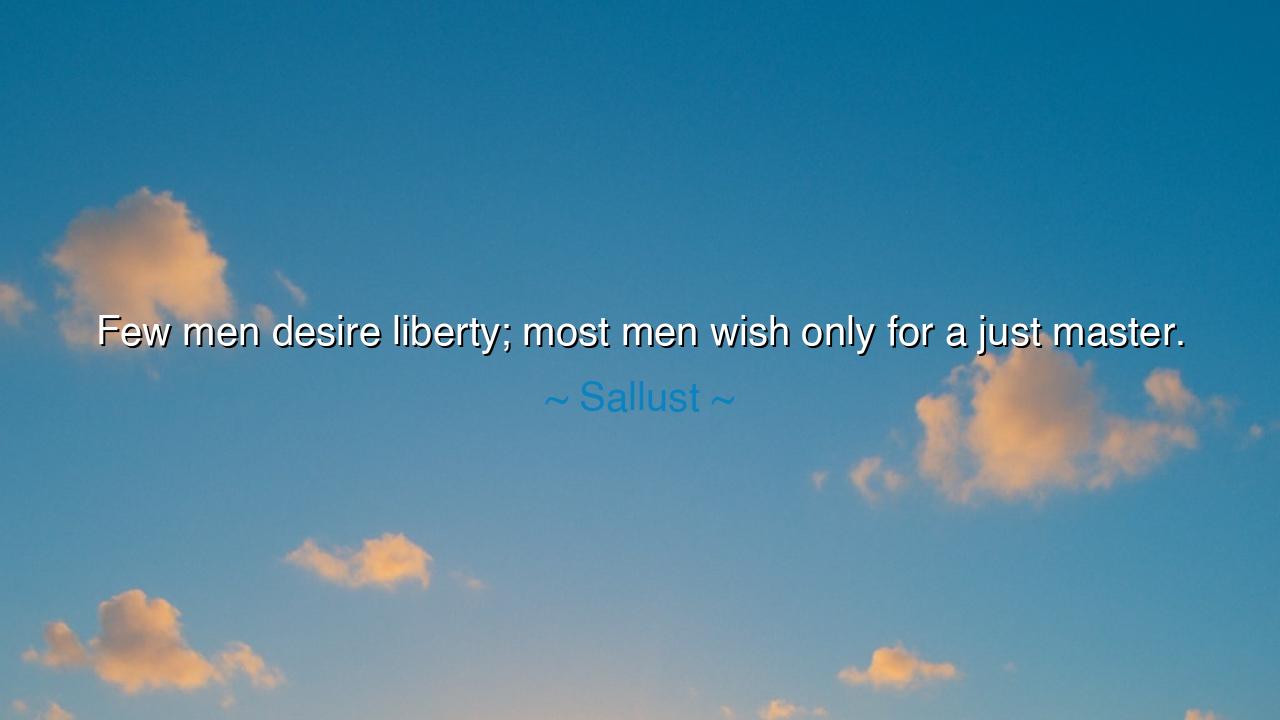
Few men desire liberty; most men wish only for a just master.






Sallust, the Roman historian, uttered words that pierce the heart of nations: “Few men desire liberty; most men wish only for a just master.” These are not the words of flattery, but of sober truth, forged in the furnace of Rome’s corruption and decline. For he had seen with his own eyes the citizens of a mighty republic grow weary of the burdens of freedom, preferring instead the comforts of obedience. What is liberty, after all, but responsibility, vigilance, and toil? Many admire it from afar, yet when offered its weight, they shrink away, longing instead for the ease of being ruled—so long as the rule is gentle.
To grasp liberty is to grasp fire. It burns in the hand, it demands courage, it requires sacrifice. It is the harder road, for it places upon each man the duty of self-rule, of decision, of standing tall without leaning upon another’s command. But to follow a master, if he be just, is easier: for then one need not think deeply, nor risk greatly. One obeys, and is spared the terror of freedom. Thus Sallust, wise in the ways of men, declared that the cry for liberty is often but a cloak, for in the hearts of most there lies only the wish for a just master.
Consider the fall of the Roman Republic. When Caesar crossed the Rubicon, many feared tyranny, yet many more welcomed him. Why? Because the storms of politics had wearied them. Liberty was disorder, liberty was conflict, liberty was heavy upon their shoulders. Better, they thought, to place their fate in the hands of one master, if only he be merciful, than to bear the endless labor of governing themselves. In this moment, Sallust’s words became flesh: a people who once bled for freedom surrendered it for the promise of security.
So too in the history of other nations. In the wake of revolutions, when liberty has been won at great cost, how often do the people grow restless, fearful, uncertain? They cry not for freedom’s challenges but for order’s embrace. Napoleon in France, Cromwell in England, countless kings and leaders rose not by seizing liberty from unwilling hands, but by receiving it as a gift from those too tired to defend it. Thus, Sallust’s wisdom echoes through centuries: most men will bend the knee, if only the master be clothed in fairness.
Yet this truth is not spoken to condemn mankind, but to awaken him. For what Sallust saw is the eternal danger—that liberty dies not by conquest alone, but by surrender. When men fail to cherish freedom, when they trade it for comfort, when they prefer the hand that feeds them to the burden of feeding themselves, then liberty withers like a flower untended. Freedom requires guardians who love it more than ease, more than safety, more than the soothing presence of a just master.
The lesson, then, is this: examine your own heart. Do you truly desire liberty, or only the comfort of being ruled kindly? True freedom will demand of you courage, vigilance, and sacrifice. It will call upon you to think for yourself, to act with honor, to rise when others would lie down. Do not be deceived by the softness of a benevolent master, for even kindness can become a chain if it binds your spirit. Better a hard freedom than a gentle slavery.
Therefore, in your life, take action: question the voices that promise to govern you in exchange for your obedience. In your work, your family, your nation, do not surrender all choices to another. Guard your independence in small things, that you may preserve it in great things. Teach your children not only to obey wisely, but to think bravely, to love the fire of liberty more than the comfort of servitude. For if only a few men truly desire freedom, let it be your resolve to stand among them.
So let Sallust’s words resound across the ages: the multitude may cry for masters, but let the few rise who long for liberty. For in the end, it is not the just master who shapes history, but the free men and women who dare to claim their own destiny. And though the path be hard, their names will endure, for they chose to walk in the light of freedom rather than sleep in the shade of servitude.






AAdministratorAdministrator
Welcome, honored guests. Please leave a comment, we will respond soon